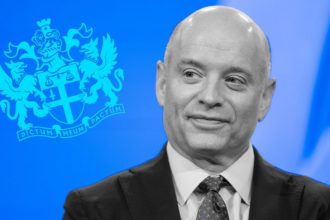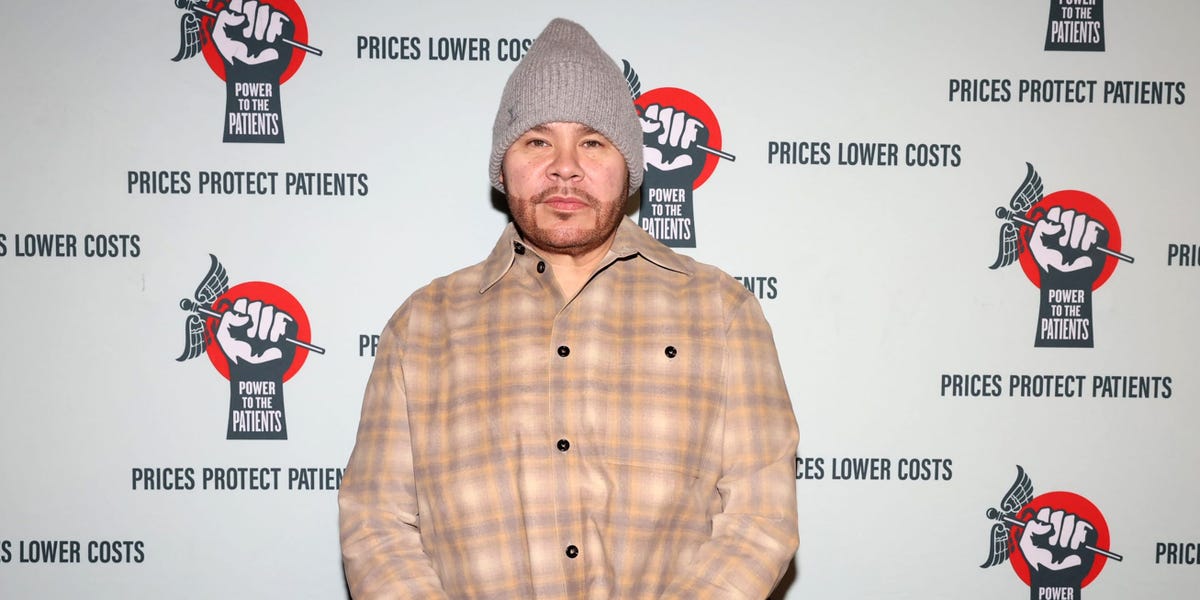- Fat Joe spoke to Business Insider about his work advocating for healthcare price transparency.
- Last week, Fat Joe, Jelly Roll, and Wyclef Jean hosted an event in Washington, DC for the cause.
- The event followed a series of advocacy efforts from Fat Joe and Power to the Patients.
In 2021, hip-hop artist Fat Joe joined the nonprofit organization Power to the Patients in an ongoing series of efforts to advocate for greater price transparency in the US healthcare system.
Fat Joe spoke to Business Insider in a phone interview last week following the latest development in the organization’s advocacy work in Washington, DC.
After meeting on Capitol Hill last Wednesday with a group of congressional leaders that included Democratic leader Hakeem Jeffries, Congressman Frank Pallone, and Sen. Mike Braun, Joe hosted an event at Hamilton Live that evening in support of recent healthcare transparency legislation. Around 500 Congress members and government officials attended to watch Joe perform with artists Jelly Roll and Wyclef Jean, according to the artist’s rep.
In discussing his work “fighting for” the more than one hundred million Americans in medical debt “to get the right laws passed and enforced,” Joe cited a recent Marist poll showing 94% of Americans favor legislation that would require hospitals and insurance companies to more readily and accessibly disclose healthcare prices.
(A July 2023 report from the nonprofit group Patient Rights Advocate found that, in a survey of 2,000 hospitals, only 36% complied with a 2021 federal Hospital Price Transparency rule. Last month, a bipartisan group of senators introduced a bill to strengthen and expand healthcare price transparency requirements and build on legislation that earlier passed the House.)
Last week’s event followed several years of joint advocacy work from Joe and Power to the Patients, which was co-founded in 2021 by Cynthia Fisher, Kevin Morra, and Paul Morra. In 2023, the artist and organization collaborated on an April meeting with congressional leaders and a September PSA on healthcare price transparency featuring hip-hop figures like Chuck D, Busta Rhymes, Rick Ross, and Method Man, among other efforts.
This interview has been edited and condensed for clarity.
I wanted to start out with a recap of your work on this front. How did you get involved with Power to the Patients?
Lemme start by saying I have a good friend who’s one of the founders of Power to the Patients, Kevin Morra. He’s been my friend for over 20 years. I met him through MTV, and we’ve kept in touch for 20 years. He came to me and told me how passionate he was and educated me on how many people are hurting in America. If that wasn’t enough, he connected me with the founder of Power to the Patients, who’s a lady named Cynthia Fisher, who’s probably the smartest woman I ever seen in my life.
She’s breaking down to me these stories of compassion and how she got involved, like a guy who was her employee for 20 years. They was sick, and they couldn’t even go to the hospital. They didn’t know whether to send their son to college or have to pay for these hospitals. There’s a woman that has a rubber band around her wrist that says, “If I get sick, put me in an Uber. Don’t put me in an ambulance. Don’t call 9-1-1 and put me in an ambulance.” ‘Cause American people nowadays are fighting just to pay the bills, and they don’t want to get hit with no $50,000 ambulance charge.
So, this is the problem, and it’s breaking the American family. There’s over a hundred million Americans that are in debt to the hospitals and the insurance companies. I like to speak and talk for the voiceless, and that’s pretty much what I’m doing here.
What perspective do you bring to the cause from personal experience, if you don’t mind the question?
From personal experience?
Yeah.
Well, I’m not personal. You know, I’m an open book. I’m for everyone. Whether it’s music, whether it’s advocacy, I’m in service to the people. When I speak, I speak for the people. When I went to Capitol Hill yesterday, do you know who came out before the politicians? All the employees. The janitors, the cooks, the mail room clerks, the secretaries. These are the people I speak to. Although I’m successful and I’m in an affluent position, those are the eyes that look at me and say, “Joe, we know you, and we know you’re fighting for us.” And that gives me the joy, that gives me the pleasure, to know that my people know that I’m fighting for ’em.
After this week’s event, with a bill in motion, how are you viewing the prospect of legislative change?
Well, we gotta thank the Congress for passing a law recently. But we like the language in the Senate a little bit more. Healthcare keeps going up, and the American worker keeps making less. How do you expect them to not be in debt? What I’m tryna do is humanize the situation, and letting all the politicians know that when they first had ambitions to become politicians, they made promises to the people that they’ll be there for them. Now, I find a lot of politicians become desensitized, numb. They heard this, they heard that, they heard this, and some of their friends are close with certain things.
All I try to do is go up there and put a face to the hundred million voices and say, “Hey, look, man, guys, the hospitals and the insurance companies, they made trillions and trillions and trillions of dollars. The gig is up.” These hospitals are causing a big hemorrhage in the families of American people. Now, Joe, what are you talking about? Is this just Black and Latino? Is this the Black and Brown? Of course, we are affected disproportionately. But this is Amish. This is Native American. This is Jewish and Muslim. This is white, Black. This is all Americans. This is bipartisan. This is Republican, this is Democrat. You know, this affects everybody. This ain’t about one group of people. This is about we, the people, the American people.
When you met with members of Congress this week, what do those conversations look like, and do you feel you’re getting through to them?
Well, when I came to Washington three years ago, we had one gentleman from Kentucky who met with us. He was the only brave one to meet with us. I get his name wrong all the time. And then I came back the second year, and 40 politicians met with us. Then I came back this year, and 80 politicians met with us. So it’s an idea of whose time has come, and the writing’s on the wall. They just did a poll. 94% of American people want transparency in healthcare. And the other six didn’t know what the question was. If this isn’t something that American people want bipartisan, I mean, you tell me what there is.
And I know a lot of our politicians are defeated, beat up. They look like they’ve been fighting on the right side of things and can’t get stuff done because there’s a lot of divisiveness out there. But I’m overly optimistic, and I’ve seen the momentum. I’ve seen the swing. It went from, “Good luck.” I’ll never forget the first politician I met with. I seen him, too. He was at the event two days ago, and I seen him. His title was Health. I don’t want to tell you who he is, but he’s in charge of health in America. And when I told him our idea, he said, “Huh.” He breathed in and said, “Good luck.”
And so now, we threw an event the other day where we had Jelly Roll perform and Wycelf Jean and everybody came out celebrating Power to the Patients and transparency. And he was in there. And I looked at him and I said … Because, you know, I don’t get high, brother. I don’t get high, I don’t get high. I never had a cigarette in my life. So, uh … my facial recognition is incredible. So when I seen him, I said, “Man, you remember the first time I met you? And you was like, ‘Huh. Good luck.'” And he looked at me. He smirked. I said, “Look at us now, man.” He smiled at me. He said, “Job well done, Fat Joe. Job well done.”
What made Jelly Roll and Wyclef Jean the right folk to link with on this particular event?
Well, last year we brought it all hip-hop. We had Rick Ross, we had Busta Rhymes, we had French Montana. We shot PSA commercials. We had Chuck D. You know, these are artists, they’ve been around for 20 plus years, 30 plus years. And their whole entire narrative is they won’t sell their soul for no one. You can’t buy these guys, right? When they do a PSA, Method Man, and they’re on the frontline talking about Power to the Patients, and they talking about, “We want to see the prices,” you know, this tore through the hip-hop community. Because these are the guys that, when they say something, they stick by it. And I’m proud that all my guys came last year.
And this year, you know, I’m a huge fan of Jelly Roll. I had a brother who dealt with addiction to the point where he went blind from using drugs. And I put him in 30, 40 drug rehabs. I bailed him outta jail 90 times, you know. So when I analyzed the story of Jelly Roll, it just hit close to home. And even if it’s country or it’s hip-hop, it’s the same old thing. His music is so powerful and impactful. Wyclef Jean? Why not Wyclef Jean? Wyclef Jean is one of the greatest entertainers in hip-hop history. The Fugees. And he gets it. You know, he’s a refugee from Haiti. He actually ran for president of Haiti. So he overstands. He gets politics too well.
So, to have him on board, I mean, this was a party. Let me tell you something. I was hosting the event the other night, and Jelly Roll, man, he almost made me cry onstage. His music does that to me. I love this guy and his story. And when I went to introduce Wyclef, I told the crowd, “Listen guys, 20 years from now, you’re gonna go back and pinch yourself and say, ‘Remember 2024, when Jelly Roll and Wyclef came and performed in Washington?'” It was that type of night. It was that type of night.
I know the advocacy effort is ongoing. What are your plans and vision on this front moving forward?
I’m not a politician, nor do I ever want to be a politician. I’m here fighting for the people trying to get the right laws passed and enforced. On a local level, we need the prices, not the estimates. Now, what does that mean, Joe? Well, if I’m going to have a colonoscopy, I want to look up my three favorite hospitals and see what the prices are. One might have it for $2,000. One might have it for four. One might have it for $17,000. I’m pretty sure I’m gonna pick the two. Right? It’s the only thing in the world that you go to and you gotta guess how much you’re paying. Premiums going up, prices going up. People getting sicker because they’re avoiding going to the hospitals for prevention to begin with, ’cause they scared of the mystery bill.
Now, on the government side, we need the data. And that’s the main concern. Because if you don’t know what they charging you, it’s like getting an American Express card bill every month for a hundred thousand, and they just like, “Yeah, yeah, you spent it.” And you’re like, “But where? Did I buy a fur coat? What did I do?” And, “Nah, nah. That’s what you spent.” In a nutshell, that’s what it is. We want to pass the right law, and we want it enforced. ‘Cause Donald Trump passed a transparency law, but it’s never enforced. You think about the thousands and thousands of hospitals in America, they got four tickets. Imagine I ate every light in the world driving a car, and caught four tickets. And that’s it in a nutshell, my brother.
Read the full article here





